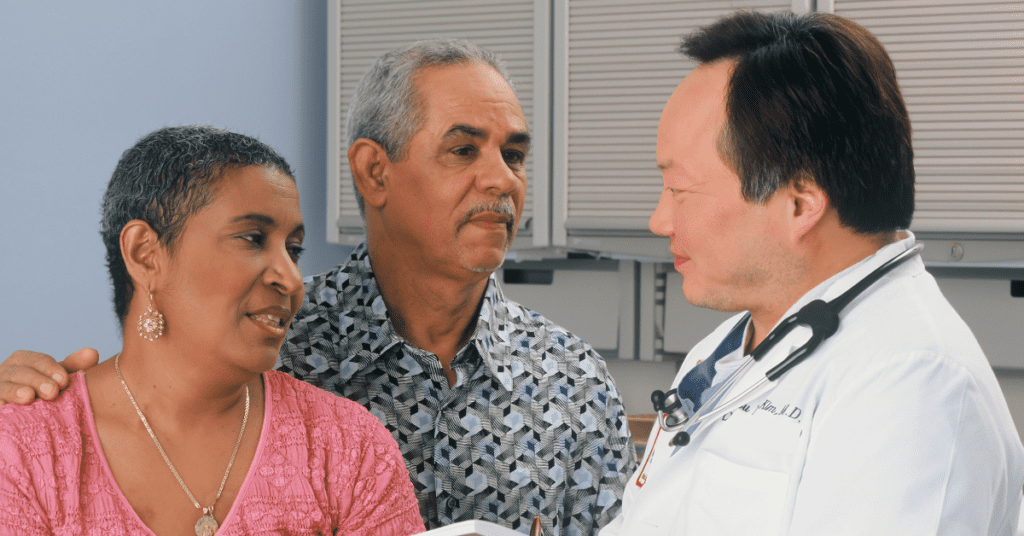Tinnitus patients come from all backgrounds and can be of all ages. Consequently, it is highly possible and even likely that you have tinnitus sufferers in your midst–if you are not one, yourself. That being said, it is not always simple or easy to understand how to address someone with a complicated health problem like tinnitus, and many loved ones are unsure how to address the unique set of symptoms and challenges that tinnitus brings. To that end, we’ve developed a series of ways to support tinnitus patients as they work through diagnosis and ever-present symptoms.
What Is Tinnitus?
Tinnitus is a hearing condition in which people hear phantom ringing, or other sounds in one or both ears. Tinnitus, to fit diagnostic criteria, cannot be explained by external sounds, and most often cannot be heard by others. This type of tinnitus is called subjective tinnitus. In rare cases, objective tinnitus symptoms do arise, and other people as well as the person with tinnitus can hear the tinnitus – the source most often a result of a heart-related condition that warrants medical attention.
Tinnitus is a common condition, affecting between 15 and 20% of the adult population in the United States. Although it can exist on its own, it is typically caused by an underlying condition. Tinnitus volume and severity varies from person to person. For some, tinnitus depends on factors like stress management and sleep quality, and tinnitus is largely mild or non-bothersome. For others, tinnitus symptoms are severe, and they negatively impact quality of life.
"Treble Health helped me reduce my tinnitus by about 80%, and now I can live my life again!"

"Treble Health helped me reduce my tinnitus by about 80%, and now I can live my life again!"
– Steve D.
Book a free consultation to learn which Treble Health solution is right for you. Join Steve and thousands more who have found lasting tinnitus relief.
If you are not familiar with the sound of tinnitus, it can be difficult to relate to someone with the condition, because it is effectively an invisible illness and cannot be seen or heard by others. Dismissing tinnitus, however, can lead to an intensely negative emotional experience, as many people struggle to have their hearing loss and hearing symptoms taken seriously or understood on their road to diagnosis.
Some people do experience temporary ringing in the ears that is non-bothersome, but it is essential not to compare temporary ringing to a long-term condition like tinnitus; one is a temporary discomfort, while the other has the potential to significantly impact quality of life. While it can be difficult to watch someone you care about suffer from any health condition, it is important to understand that there are ways to improve tinnitus symptoms, and it does not have to be a debilitating health condition long term–and the support and understanding of a loved one’s pain can speak volumes in the midst of an uptick in symptoms.
Common Causes Of Tinnitus

Hearing loss types, including presbycusis (also known as age-related hearing loss) span across many different causes and solutions. Losses can be noise-induced, congenital, or sudden, as a result of ear infections or abnormalities in the growth or structure of the ear. Head or neck injury can also be at the root of tinnitus, as can certain medications with a history of ototoxicity (causing damage to auditory function).
Other chronic health conditions such as Meniere’s Disease, eustachian tube dysfunction, temporomandibular joint disorder (or TMJ dysfunction), acoustic neuroma, head and neck tumors, cardiovascular disorders, and more can all be at the root of tinnitus symptom onset. Treatment options for tinnitus will depend on which of the sources above are responsible for symptoms.
Tinnitus Symptoms
Symptoms of tinnitus can differ somewhat, but most patients describe symptoms as a ringing in the ears, or a sensation of buzzing, chirping, hissing, or even hearing a faint musical tone. Sounds can fluctuate or change throughout the life of the condition, and the volume and intensity of sounds can change, as well. Tinnitus may be heard in one or both ears, may involve constant noise or intermittent noise, and may qualify as pulsatile or non-pulsatile.
Tinnitus itself is a unique disorder, and even the person who has symptoms may not be able to tell you how it will behave from day to day. All tinnitus patients experience their symptoms in different ways, and describe how it impacts their lives in different ways.
Getting A Diagnosis And Professional Care
If you know or love someone with bothersome tinnitus, it is vital to receive care. Encourage anyone with symptoms to schedule an evaluation with an appropriate healthcare professional, such as an ear, nose and throat doctor or an audiologist. Physicians can provide people with suspected tinnitus with a medical exam to evaluate for specific ear, nose, and throat concerns that can correlate to tinnitus. They can also take an extensive medical and pharmacological history to diagnose any possible underlying cause of symptoms and then make appropriate referrals. While overall hearing health may be evaluated with a hearing test from a Doctor of Audiology, additionally, some Audiologists/Doctors of Audiology are also trained specifically in tinnitus management and can perform other evaluations in addition to a hearing test; such as Tinnitus Pitch and Loudness matching. These additional tests help to put quantifiable numbers/data to a person’s tinnitus, which can be helpful in the process of the patient feeling understood and properly diagnosed. This data is often used as part of their treatment plan as well.
Unfortunately, there are some professionals who believe that tinnitus is a lifelong condition without a true source of intervention. It is vital to find the right provider, to make sure that your symptoms are properly catalogued and your unique needs are met. Patient education is often extremely important, as it takes away the sense of fear or foreboding that often accompanies not understanding tinnitus and why it has developed. When people realize what tinnitus is and how it can be managed, they can move forward with their own treatment plan.
Professional evaluations will help people with tinnitus create an actionable plan moving forward, and can help people feel as though they are empowered enough to target their tinnitus, while dealing with the condition alone can feel lonely or hopeless. Follow-up visits recommended by professionals are also important, as they can help ensure the health of the inner ear and other parts of the ear, can help navigate everyday life, and can help people with tinnitus relax mentally.
Tinnitus can take a heavy toll on people, and make it difficult to relax physically or mentally. A doctor can recommend the simplest coping strategies all the way up to the most complicated interventions, so don’t be afraid to reach out for help.
Tinnitus Management Options
There are various options for tinnitus treatment, based on the underlying cause of symptoms. Not everyone with tinnitus will experience full relief, but it can be easier to manage over time using some or all of the following strategies:
- Hearing aids
- Sound generators and sound masking devices (these may include a white noise machine, nature sounds, or even pillow speakers)
- Tinnitus Retraining Therapy (TRT)
- Cognitive Behavioral Therapy (CBT)
- Stress management and relaxation techniques
- Treating underlying health conditions
Currently, there are research studies evaluating electrical stimulation and transcranial magnetic stimulation, but these are not currently recognized or recommended as official cures. Using environmental sounds, white noise, hearing aids, and therapy techniques are all tried and tested ways to relieve symptoms and improve quality of life. The current goal is not to cure, as no cures are currently recognized, but instead to treat, helping tinnitus patients feel better equipped to handle their tinnitus symptoms.
Supporting Tinnitus Patients

Helping tinnitus patients can look like offering to support them at appointments, encouraging them to follow up with specialists, taking them to visits, talking about how their tinnitus treatment is going, or even using white noise, yourself, to help a person’s quality of life during visits or time together. It can be frustrating when treatments do not work, or discouraging to learn there is no known cure, so support and encouragement are often the best ways to help.
Support often starts from the onset of symptoms, and continues through the many evaluations, possible diagnoses, and decision-making processes regarding management options. To offer support and help during this time, it is important to help people with tinnitus feel supported. This can mean using background noise when together, encouraging them to move forward with one (or several) tinnitus management options, or simply lending an ear during the trial and error phase of treatment.
Treating and managing chronic tinnitus can require a one-step-forward and two-steps-back approach. Management is not one size fits all, and there is often a team of people involved in successful management efforts. This can feel frustrating or overwhelming at first, and a person’s ability to cope can depend somewhat on the support and encouragement of loved ones. What does this look like? Support and encouragement can look like:
- Showing empathy and compassion
- Educating yourself
- Asking them about their experience
- Helping them relax and manage stress
- Using sound therapy or background noise (even nature sounds and ocean waves can help)
- Exploring management options with them
- Helping them select sounds that mask tinnitus–including working together to find soothing sounds if the person with tinnitus is your significant other
Additional Ways To Support Those With Tinnitus
In addition to the basic support efforts identified above, you can explore different ways to manage anxiety and stress levels, and investigate different methods of treatment alongside them. These might include developing:
- Hearing loss management skills
- Utilize good communication strategies – hearing disorders of all types can come with hearing loss. To get the attention of someone with a hearing disorder, get their attention, make eye contact, and speak at a lower rate with well-articulated words.
- Be mindful of creating loud sounds and exposing others to too much noise. Loud noises can not only cause hearing dysfunction, but can also make an existing condition worse.
- Encourage anyone currently treating tinnitus to adhere to all protocols. Wearing hearing aids, using hearing protection, and managing stress are all vital steps toward successful treatment.
- Distraction methods
- Being engaged in activity can take one’s mind off the bothersome sounds they hear. Many tinnitus sufferers experience symptoms of depression, which can make enjoyment difficult. Encourage anyone with the condition to find things they enjoy, and even join in on that activity with them.
- The more engaged someone is in their life and lifestyle, the greater the likelihood is that symptoms will not be as bothersome or frustrating. Do not stop inviting them out, or doing things you love together.
- Healthy lifestyle practices
- Tinnitus can be exacerbated by high amounts of certain substances such as alcohol, caffeine, and sodium. Eating a healthy, whole-food diet and abstaining from potentially harmful substances can also help manage hearing loss or dysfunction.
- Hydration, nutrition, and adequate amounts of sleep are also extremely important. While you cannot enforce healthy lifestyle habits, making sure that you are managing your own and encouraging those in your life to do the same is a great way to offer support.
- Health and hearing resources
- Organizations such as the American Tinnitus Association can help provide valid information on tinnitus and keep you apprised of the latest in health and management.
- Healthcare professions and audiologists that specialize in tinnitus can provide additional resources specific to individuals’ needs and often offer personalized treatment plans. These can be an excellent resource to anyone new to management or in search of a more effective form of intervention.
Having support can make all the difference in a diagnosis and treatment journey, from selecting a well-fitting and high quality hearing aid to learning how to manage the anxiety that can come along with tinnitus and ultimately make tinnitus worse. If you know and love a person suffering from a hearing disorder or hearing loss of any kind, the ideas described above can be an excellent starting point for coming alongside and offering care and empathy during a difficult time.
Next Step: Book Free Consultation
- 75% of patients reduced their tinnitus within three months after following our recommendations.
- "I feel like Treble Health literally gave me my life back." - Randy S. (verified customer)
- Join thousands of people who have reduced their tinnitus after scheduling a free consultation.












